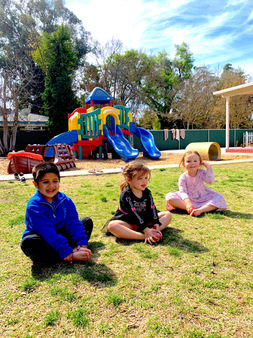
Programs
Enrichment

Spanish
Learning a second language boosts problem-solving, critical-thinking, and listening skills, in addition to improving memory, concentration, and the ability to multitask.
The focus of our Spanish Program is to provide the children with a firm foundation of the Spanish language through listening and speaking activities. Lessons incorporate singing, dancing, games, and cultural experiences. Spanish lessons are also integrated with classroom curriculum concepts. Students enrolled in Fairmont have an opportunity to work with our Spanish teacher several times a week during Spanish class. Students participate in a variety of activities and lessons that provide an introduction to the Spanish language. Our Spanish teacher uses a variety of techniques to help with language acquisition, including music, literature, games, art, cooking, and other small group activities.
Agriculture
Knowledge of healthy eating and nutrition learned early on may benefit children for the rest of their lives. For this reason, we teach children about where their food comes from and how it is grown.
During your child’s time in the Fairmont Private School garden, students experience hands-on learning about such things as plants, animals, food, environmental impacts, land management, and responsible stewardship in a farming environment.
They plant and harvest the produce sold in the Fairmont Farmer’s Market that we offer to Fairmont families. In addition to being used as a tool to teach children about healthy eating and nutrition, thanks to the Fairmont Garden and Chicken Coop children learn about responsibility, the importance of agriculture, and the environment in a fun way.


Music
Music teaches children about patience, improves brainpower, inspires creativity, self-expression, and patience.
At Fairmont, we believe that every child is musical and has the right to participate confidently in the music of our culture. Music competence – both singing in key and keeping a steady beat – is a skill set that is nurtured through developmentally appropriate musical experiences. For young children, this means exposure to music in a play-based environment with modeling provided by the teachers in the room.
We lead the children through music and movement experiences, including rhythmic rhymes, fingerplays, small- and large movement activities, and play using instruments such as egg shakers, scarves, drums, rhythm sticks, and resonator bells. The activities are presented as informal musical experiences that children can access at their own level of readiness. Children are encouraged to think of themselves as music-makers and not just consumers of music. Classroom activities not only develop music skills, but also nurture creativity and confidence while also supporting social, emotional, cognitive, and physical development.

Creative Movement
Exercise is a habit that can benefit us throughout our entire life. We instill that in our students as young as possible with creative movement at Fairmont Private School.
This program has been designed to increase balance and gross motor skills with our students, it also encourages social development and self-awareness through breath work and incorporates elements of yoga and dance exercises with a variety of music styles
Children develop core strength and mindfulness of breath as well as spatial awareness. Older students have opportunities to begin working with partners in partner poses and movement exercises that emphasize teamwork in following and leading. These exercises help students learn about teamwork and work closely with others, while also learning about themselves.
Cooking
Through cooking activities the children learn about preparing and eating real food through hands-on discovery.
At Fairmont children learn the basics of successful living, we offer fun classes about healthy eating and cooking to teach students about good food choices and cooking. The hands-on lesson focuses on using mostly fruits and vegetables (as well as the occasional treat), to cover concepts like color and shape recognition, sensory integration, as well as build fine motor skills as the students work “in the kitchen” to prepare a snack.
It starts by reading a story to the class before the cooking lesson begins. With the use of imagination, the classroom turns into a kitchen and tiny hands become important tools, like chef’s knives and cheese graters as the class follows a recipe and step by step instructions to make a snack.





























